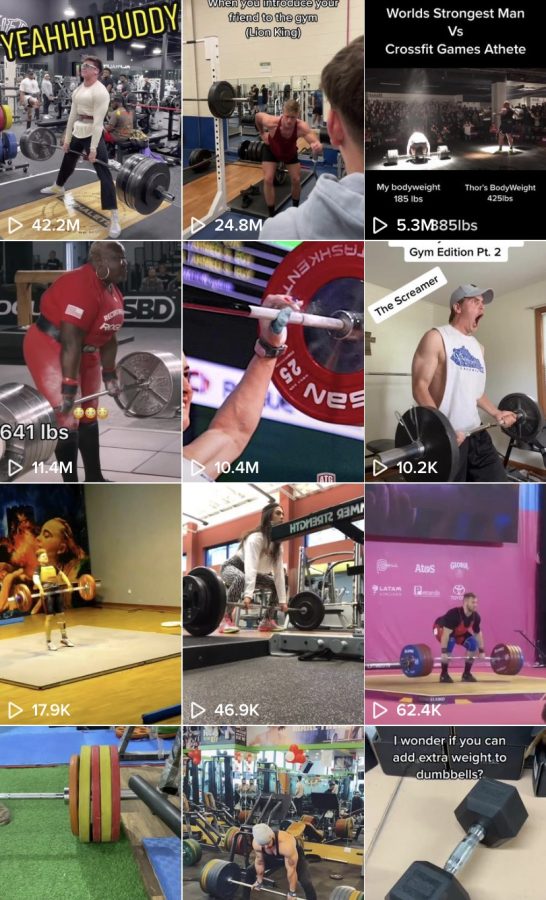“FitTok”: social media’s influence on gym culture
Photo courtesy of Brendan Talbot
Apps like TikTok help perpetuate both the positive and negative aspects of gym culture.
Over quarantine, social media rekindled the old flame of gym culture. Apps like TikTok and Instagram have fueled a resurgence in weightlifting among any demographic with access to a screen. Male, female, old, young, everyone is going to the gym.
Last year, the world began to reopen, and gyms re-emerged into a world that sorely needed them. Being stuck inside with plenty of extra time on their hands, COVID-19 left a populace ready to work off that quarantine 15.
COVID-19, while at first shutting down gyms, has helped them bounce back better than ever. Since historically low attendance during the pandemic, gyms like the YMCA have now experienced a 20% increase in membership. Quarantine cabin fever was the perfect kindling for a resurgence in gym culture, but social media has been what truly re-ignited the flame of physical fitness.
Social media apps such as TikTok and Instagram use algorithms to constantly feed viewers curated content. In the time it takes someone to watch a YouTube video, that same person can watch tens, if not hundreds, of TikToks on all sorts of different topics. One of the genres that has garnered the most interest on TikTok is gym-related content. The gym, fitness, and weightlifting hashtags on TikTok have a combined 300 billion views. This instant access to advice and inspiration has been a powerful tool in the growth of the community.
“Social media has influenced me by keeping me consistent and motivated,” said sophomore Ricardo Ramos.
Fitness influencers have always held a prominent position on social media. The Kardashian copycats with fake buttocks or the Arnold wannabes who use so much Photoshop that they’re closer to art projects than bodybuilders have been around for just as long as social media has. In the last few years, however, a new type of fitness influencer has emerged. These new influencers promote healthy, safe, and inclusive self-improvement.
Users like @noeldeyzel_bodybuilder, @jpgcoaching or @thejoeyswoll have gained cult followings on TikTok for their videos on all ranges of gym-related content. Noel Deyzel offers advice, humor, and even helps tackle more serious issues like depression and body dysmorphia. Joey Swoll often posts videos pointing out negativity in the fitness community, helping to promote inclusiveness and positivity. JPGcoaching especially is considered a weightlifting messiah by the community for advice and optimal training regimes.
“Many social media influencers like Alex Eubank, Jermaine Gadsden and others have inspired me to set and reach my goals in the gym,” said sophomore Jacob Kerr.
‘FitTok,’ as some call it, has its dark side, however. The same problems that have plagued social media since its inception still wreak havoc today. Constantly being exposed to models with artificial and unrealistic hourglass figures or bulging biceps isn’t healthy for anyone’s psyche.
Roughly half of all adolescents experience some form of body-dissatisfaction and over half of all bodybuilders experience full-blown body dysmorphia in part due to social media.
Not only can this constant barrage of gym-related content lead to body dysmorphia, it also often ends up creating toxic echo chambers. Internet spaces that promote steroids and other performance-enhancing drugs (PED) have become more common in the online gym community. Additionally, these groups may also encourage eating disorders or over-training. These toxic tendencies corrupt and ruin what should be one of the best things one can do for oneself: working out.
“I started weight lifting in hopes to improve my health, physique, and my overall happiness. Getting teased for growing up on the heavier side heavily influenced me to start working out,” said Kerr.
Everyone has their reason for hitting the gym; whether they want to gain weight or lose weight, become stronger or just burn off some stress, the gym provides a safe space for healthy self-improvement. Social media can be a fun and helpful tool in this journey, as long as one doesn’t let its negative aspects overpower the positive.






